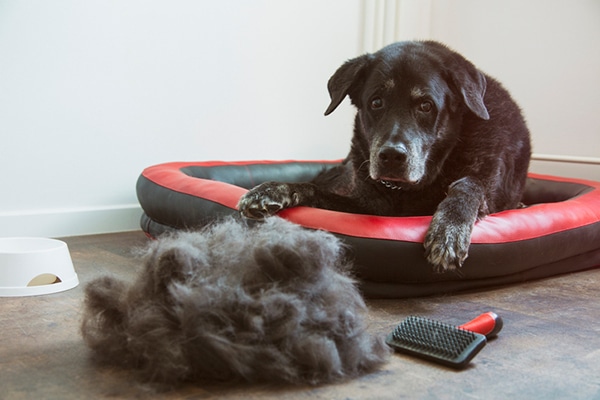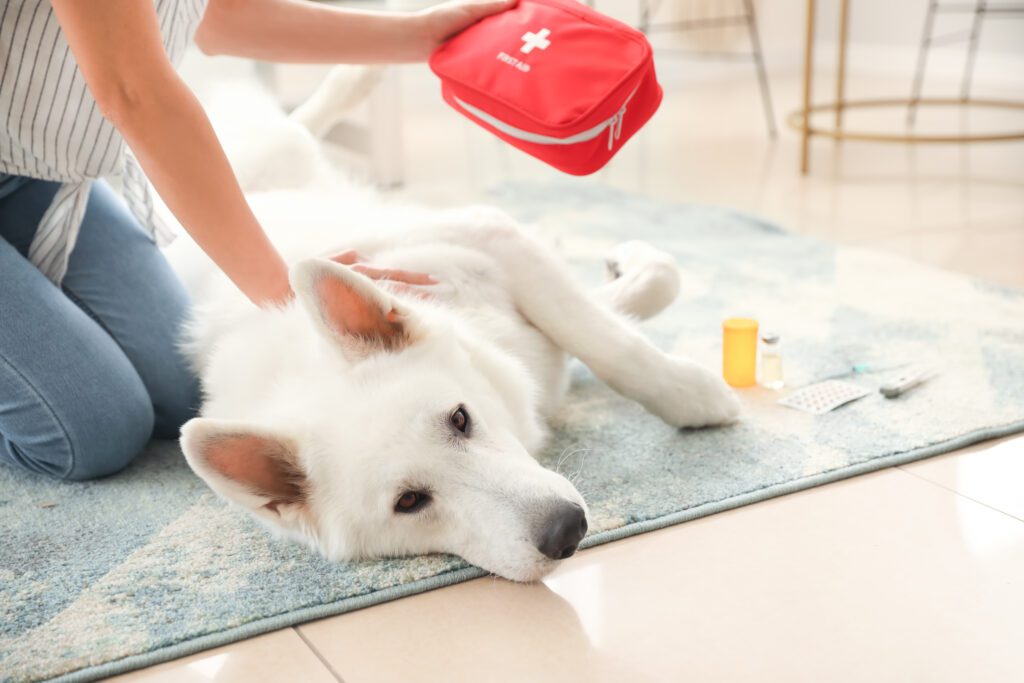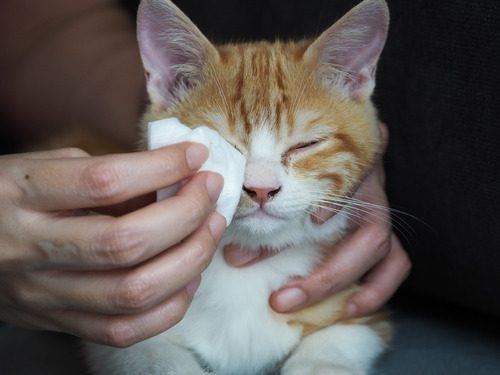Clifton Park Pet Owners: Why Is My Dog Excessively Shedding?
It’s Sunday morning and you’re sitting in your living room, enjoying a steaming cup of coffee. Sunlight streams through the window and you catch a glimpse of movement out of the corner of your eye. You turn to see a small tumbleweed roll across the floor. You pause, as you’re pretty sure you’re indoors and no where near the southwest. Is your dog excessively shedding in Clifton Park, NY?

Upon closer inspection, you notice the tumbleweed is made entirely of dog hair. You turn to your husky just in time to see her scratch her neck and see fur come off with every paw movement. Dogs shed their fur, that’s normal. But why, suddenly, does it seem like your dog is shedding more than usual?
Different Breeds Shed More Than Others
It’s easy to see a husky has more fur than a greyhound, so it makes sense they would shed more often. Many dog breeds, even short haired breeds, will shed seasonally twice a year as they lose the previous season’s coat and grow a new one.
Some dog breeds shed all year long. Dogs that spend significant time outside will tend to shed more seasonally than exclusively indoor dogs, no matter the breed.
Stress Can Lead to Excessive Shedding in a Dog
Dogs will shed as a response to stress. If you have recently had changes in the home (like construction or remodeling) this can cause stress that leads to shedding. A new baby or pet can also cause stress as you pup’s routine has changed.
If the stress is temporary or just requires an adjustment period, the shedding should calm down when your dog is feeling calmer and adjusts to new situations. If you can’t pinpoint a reason why your dog would be stressed but they seem to be nervous, it may be time to consult a veterinarian as they can provide guidance to helping your dog feel more at ease.
Licking and Shedding
Dogs are very stoic and will often hide pain. Sometimes the only sign owners see of pain will be licking. When dogs hurt in an area, like their hips, they tend to lick that area as a way to self-soothe. This can cause shedding at the area of licking.
Sometimes dogs will lick their paws in response to an allergy or because of something they walked through. Paw licking can also be a nervous behavior.
To reduce paw licking and the shedding that accompanies it, wipe your dog’s paws after a walk or when they have been outside (especially in the winter, ice melt chemicals are not always dog safe and licking it off their paws can make them sick).
Parasites in Clifton Park, NY Could Lead to Excessive Dog Shedding
Shedding (and other behaviors, like licking, scratching, and rolling) can be in response to parasites, either external or internal. External parasites include fleas, ticks, flies, and lice. Fleas are common and can be extremely irritating to dogs. They are easier to see on short haired dogs, while it may take a flea comb or parting the hair to see them on long haired dogs.
Flea Allergies
Many dogs develop flea allergies, which is an allergic response to a flea bite and will make a flea infestation even more irritating. If you suspect fleas, your vet can point you to options to eliminate fleas on your dog (topical medications that last 30 days) and in your home (carpet cleaner).
Use caution with over the counter flea topical medications as many have been found to be extremely irritating and can cause even more shedding.
Ticks Are Becoming a Bigger Problem
Ticks are becoming a problem in more and more areas, and you don’t need to have been on a wooded hike to find them on your dog. Ticks are found in many areas, especially in long grass or wooded areas. They attach to the dog and start feeding off blood (always a good idea to check yourself and your dog for ticks if you have been in a known tick area).
The bad news is aside from being irritating, ticks carry a variety of diseases that can be spread to dogs and humans and can lead to serious symptoms. The good news is that is takes about 48 hours of the tick feeding on a host to spread these diseases. Using a topical tick preventative every month on your dog will kill any ticks that attach before they can spread disease.
Monitor Your Dog During Walks
If you know your dog is very sensitive to biting insects, it is always a good idea to monitor them for ticks after each walk. Believe it or not, flies can bite. If you’ve never had a fly bite, consider yourself lucky as they hurt! Flies also love to bite dog ears. If you dog spends a good amount of time outside, it may be a good idea to ensure they are not getting fly bites on their ears or other body parts.
If enough fly bites accumulate, fly strike can occur which is painful and will cause sores and shedding. Fly strike is treatable, and there are solutions to prevent flies biting. Your veterinarian or a local farm store can advise you on ointments to apply to your dog to prevent biting flies from irritating your pup.
Lice Can Contribute to Your Dog Shedding A Lot
Lice are rarer, but they can occur. They are often hard to see and usually will require a veterinarian to find and diagnose them. Lice are seen most often in puppies or rescue animals that have spent time in tough environments. Lice are extremely irritating and will cause scratching and shedding.
Internal Parasites and Shedding
Internal parasites (worms) can lead to heavy shedding. If you notice shedding, licking (especially under the tail), scooting, or visible worms in stool or vomit, your dog needs to be treated for internal parasites. Your veterinarian will prescribe a treatment course to kill the worms.
Most monthly heartworm preventative pills also have an anti-parasite component as well, so it is always a good idea to give these year-round if you are concerned about worms.
Mange Can Cause Heavy Shedding
Mange is a word no one wants to hear. There are two types of common dog mange, demodectic and sarcoptic. Demodectic mange is more common and caused by a parasite that normally lives on the skin of dogs (and people). Usually we live happily with these organisms and never notice them.
However, if a puppy or adult dog becomes sick or has an autoimmune condition, the demodectic organisms will start to overpower the dog’s skin and lead to shedding, itching, and discomfort. These are very treatable using topical medications or dips and usually can be controlled while the underlying immune cause is treated.
Sarcoptic mange is better known by the common name “scabies.” This is transmissible to people, and it is also seen in children. The good news is sarcoptic mange is much less common in dogs than demodectic mange. Sarcoptic mange is also very treatable by your veterinarian.
Allergies and Excessive Dog Shedding in Clifton Park, NY
Allergies can cause excessive shedding in dogs. Allergies in dogs can be food allergies or inhalant (pollen, dust, or other airborne substances). Food allergies can require dietary changes and may take some trail and error to find which food is a good match and doesn’t cause symptoms. Inhalant allergies can be treated by medication prescribed by your veterinarian.
Sometimes a seasonal allergy medicine is all that is needed to quell allergies and stop shedding. Sometimes a deeper dive is needed, and an allergy panel performed. This will spell out exactly what your dog is allergic to so you can remove it from the home. Allergy shots can also be an option of your dog seems miserable. These require an allergy panel to determine the exact allergens causing your dog discomfort.
Monitor Your Dog’s Heavy Shedding
Shedding can be frustrating, but it can also be a normal part of your life with your dog. If it becomes excessive or your dog seems uncomfortable, it is always a good idea to get in contact with your veterinarian for solutions.
Recent Posts
Pet First Aid: Essential Supplies for Your Pet Emergency Kit
Pet First Aid: Essential Supplies for Your Pet Emergency Kit Every pet parent wants to keep their…
Benefits of Spaying or Neutering a Cat
Benefits of Spaying or Neutering a Cat Deciding to spay or neuter your cat is a responsible…
Why Does My Cat Get Eye Boogers Everyday?
Why Does My Cat Get Eye Boogers Everyday? Cats are known for their meticulous grooming habits, but…
About Us
Originally opened as Animal Care Hospital by Dr. Mark Johnston in 1989, the hospital became Cornerstone Veterinary Hospital in 2015 when it was purchased by Drs. Alan and Lisa Knott. The name 'Cornerstone' holds a special place in their hearts, representing not only their Christian faith but also their commitment to being the cornerstone of the community in which they practice. As a family-owned and operated practice, every pet is treated as part of the family, ensuring they receive the highest standard of care. The team at Cornerstone Veterinary Hospital is dedicated to building lasting relationships with clients and their beloved pets, striving to be the cornerstone of the community in which they practice.



